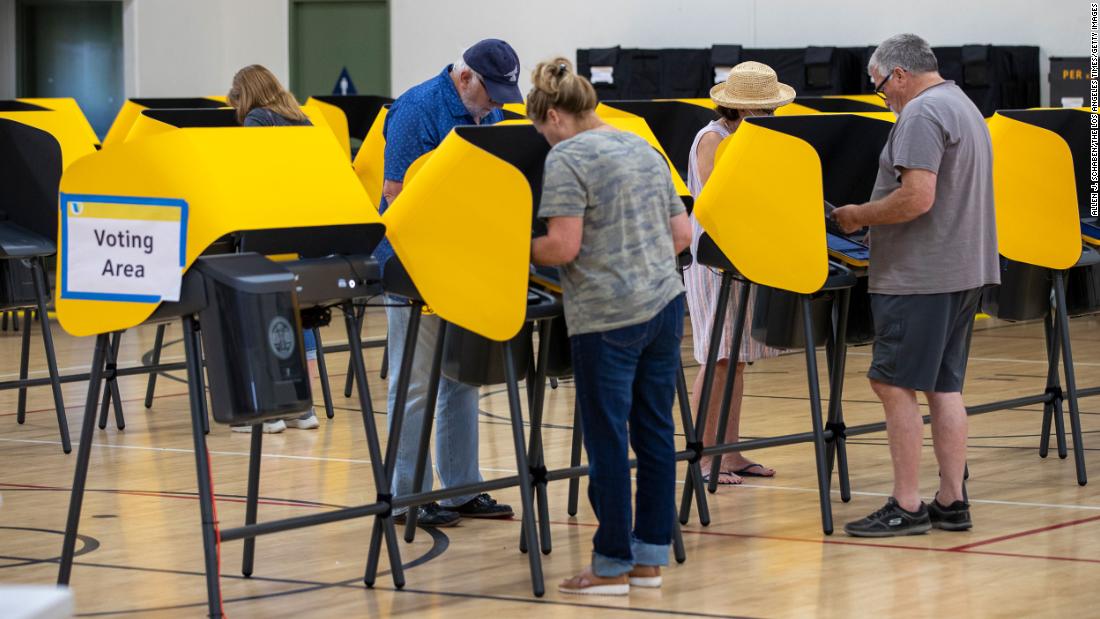Iowa surprise illustrates unsettled environment for Democrats
For months now, voters in San Francisco and Los Angeles have voiced their concerns that daily life in their cities appears to be spiraling out of control. Residents in San Francisco have been contending with a rise in burglaries and car thefts, as well an alarming spate of hate crimes directed against Asian Americans. Los Angeles residents have witnessed a sharp increase in violent crime, while city leaders have been grappling with a homelessness crisis that has led to the proliferation of tents and trash across parks, sidewalks and public spaces, while exposing an untreated mental health emergency on their streets.
On Tuesday, San Francisco voters registered their disquiet by recalling District Attorney Chesa Boudin amid concern that he was advancing progressive policies as a national criminal justice reform advocate at the cost of their safety. It was a move that signaled just how far the political pendulum has swung since the 2020 election cycle when many Democratic voters cited police accountability and criminal justice overhauls among their top concerns — a debate that reached a crescendo following the police killing of George Floyd in Minneapolis.
On the same night, voters in the overwhelmingly progressive city of Los Angeles signaled their unease with Democrats’ handling of crime and homelessness by elevating billionaire shopping mall magnate Rick Caruso, a former Republican who became a Democrat earlier this year, into a runoff race to replace term-limited Mayor Eric Garcetti.
Six-term US Rep. Karen Bass was once viewed as the frontrunner in the mayor’s race, but Caruso mounted an unexpectedly strong challenge against her, spending $40 million to push the argument that city leaders have failed to keep people safe and have proven inept in finding solutions to house some 41,000 people living on the streets.
Bass, who led the House negotiations on legislation to increase police accountability after Floyd’s death, has promised to make public safety a priority. She pledged to restore the Los Angeles Police Department to its authorized force of 9,700 officers, in part by hiring more civilians to free up 250 officers to return to street patrols. But she has not gone as far as Caruso, who has promised to hire 1,500 additional officers and to bring on some 500 sanitation workers to clean up the streets — proposals that his critics say the city cannot afford.
For months now, the crosswinds facing Democrats nationally as they struggle to find an effective message on crime and inflation have been apparent in races across California, where Democrats currently hold all the statewide offices and dominate the congressional delegation.
The low turnout in Tuesday’s elections in California and New Jersey was another sign that Democrats are failing to energize their voters in states that will be key to their hopes of holding control of Congress.
Voters also cast ballots in Iowa, Mississippi, Montana, New Mexico, and South Dakota on Tuesday in primary contests that offered a window into how much voters intend to blame the party in power for their dissatisfaction about the state of the economy and the country.
GOP Rep. Young Kim confronted strong competition from her right flank in the newly drawn 40th District in Orange County from Marine veteran Greg Raths, another Trump loyalist.
On the flip side, Democrats hope to use GOP Rep. Mike Garcia’s ties to Trump against him in California’s 27th District after redistricting made his northern Los Angeles County seat more Democratic. (Garcia voted against certifying the 2020 presidential election results in Arizona and Pennsylvania.) Former state Assemblywoman Christy Smith, a Democrat, will advance to a runoff in the district with Garcia, CNN projected.
Following Finkenauer’s recent blunder — where she almost failed to qualify for the ballot when a judge found that she had not met the signature requirements — as well as her loss two years ago to Republican Rep. Ashley Hinson, Democrats in the Hawkeye State went in a different direction. They chose retired Navy Adm. Mike Franken to go up against Grassley, the longest-serving Republican in the US Senate, who will win his party’s primary as he seeks an eighth term, CNN projected.
Finkenauer served for one term in Congress after she won a district in 2018 that former President Donald Trump had carried two years earlier. At that time, she was the second-youngest woman ever elected to Congress, at the age of 29.
Elsewhere in Iowa, one of the most competitive races is in the 3rd District, where Rep. Cindy Axne, the only Democrat in the congressional delegation, hopes to hold her seat in a district that Trump would have won by less than half a point. CNN projected that state Sen. Zach Nunn, an Air Force veteran, will win the Republican primary in the Des Moines-area district.
The other two competitive House races in Iowa are set. GOP Rep. Mariannette Miller-Meeks will face Democratic state Rep. Christina Bohannan in the new 1st District. In the 2nd District, Hinson will face Democratic state Sen. Liz Mathis, who is also a former local TV news anchor.
There were also several high-profile congressional races in New Jersey. In the state’s 7th District, a battleground that became more Republican in redistricting, CNN projected that Democratic Rep. Tom Malinowski and Republican Tom Kean Jr., the former state Senate minority leader and son of former New Jersey Gov. Tom Kean, will face off in the general election.
In the 8th District in northern New Jersey, Democrat Rob Menendez Jr., son of New Jersey Sen. Bob Menendez, will win the Democratic primary, CNN projects, as he runs for the seat of retiring Democratic Rep. Albio Sires.
This story has been updated with additional developments.
![]()


